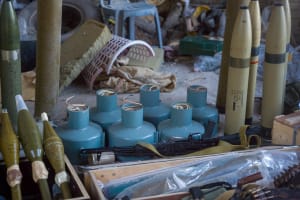Israel braces for Iranian retaliation, but threatens: Massive harm to civilians will mean war
Security systems prepare for several possible ways of retaliation

Following two high-profile assassinations in the space of 12 hours, Israel is preparing its security apparatus and infrastructure for a potential retaliatory response from Iran, which might come in various different ways.
While the Israeli military stated it was preparing its defense systems and raising its overall preparedness, which reportedly includes a curfew on its fighting units, IDF Home Front Command so far hasn’t updated the guidelines for the public.
This suggests the IDF does not currently expect massive attacks on civilian targets, or at least believes it can warn the public to seek shelter in time.
In addition, Israel communicated its message through Western and regional officials that a massive attack on civilian targets would trigger an all-out war, according to Ynet News.
Iranian Supreme Leader Ali Khamenei has reportedly ordered his forces to prepare a direct strike against Israel in retaliation for the assassination of Hamas political leader Ismail Haniyeh in Tehran, The New York Times reported.
The report added that Iran does not intend to target civilian sites, aiming instead at military bases.
Meanwhile, the civilian routine in Israel continues almost without restrictions. While the air space in northern Israel has reportedly been restricted, Ben-Gurion International Airport continues to operate normally, despite several airlines announcing the suspension of their flights to Israel.
At the same time, the IDF has ordered to raise the alert level surrounding representatives of state, including the Israeli Prime Minister Benjamin Netanyahu and leading politicians, as well as international embassies.
The domestic intelligence service Shin Bet issued highly unusual and strict security protocols for Netanyahu and the Cabinet ministers, according to Israel's Channel 12 news.
Under these instructions, any participation in a large event requires immediate access to a bomb shelter and any official visit or tour by Netanyahu or government ministers requires approval from Shin Bet Director Ronen Bar.
Israel’s diplomatic staff around the world, especially ambassadors, were instructed to keep a low profile for the time being and avoid large crowds. Security at embassies and diplomatic buildings has also been increased.
Security officials have conducted several discussions and situational assessments over the past few days to coordinate responses for every possible scenario.
The security establishment estimates that a response from the Iranian regime will come within the next few days, contrary to Iran’s direct attack on Israel last April, which came almost two weeks after Israel assassinated an Iranian military official in Syria.
The possible attack scenarios on Israel include a direct Iranian combined drone, a rocket and missile assault similar to April, or assassination attempts on Israeli officials or Jewish leaders abroad.
Another possibility is a coordinated attack by Iran and Hezbollah, or perhaps other Iranian proxy forces in the region, such as the Houthi rebels in Yemen and militias in Iraq and Syria.
More far-fetched scenarios include cyberattacks to disrupt daily life, targeting banking, transportation, or energy infrastructure, Ynet News’ military correspondent Yoav Zitun estimated.
On Thursday, the CEO of the Israel Electricity Company (IEC), Meir Spiegler, told Channel 12 that in a worst-case scenario, some locations in Israel could lose electricity for up to 12-48 hours during a large-scale attack.
“If strategic sites are targeted in an extreme situation, it could take 12-48 hours to fix them,” he said.
We recommend to read:

The All Israel News Staff is a team of journalists in Israel.














